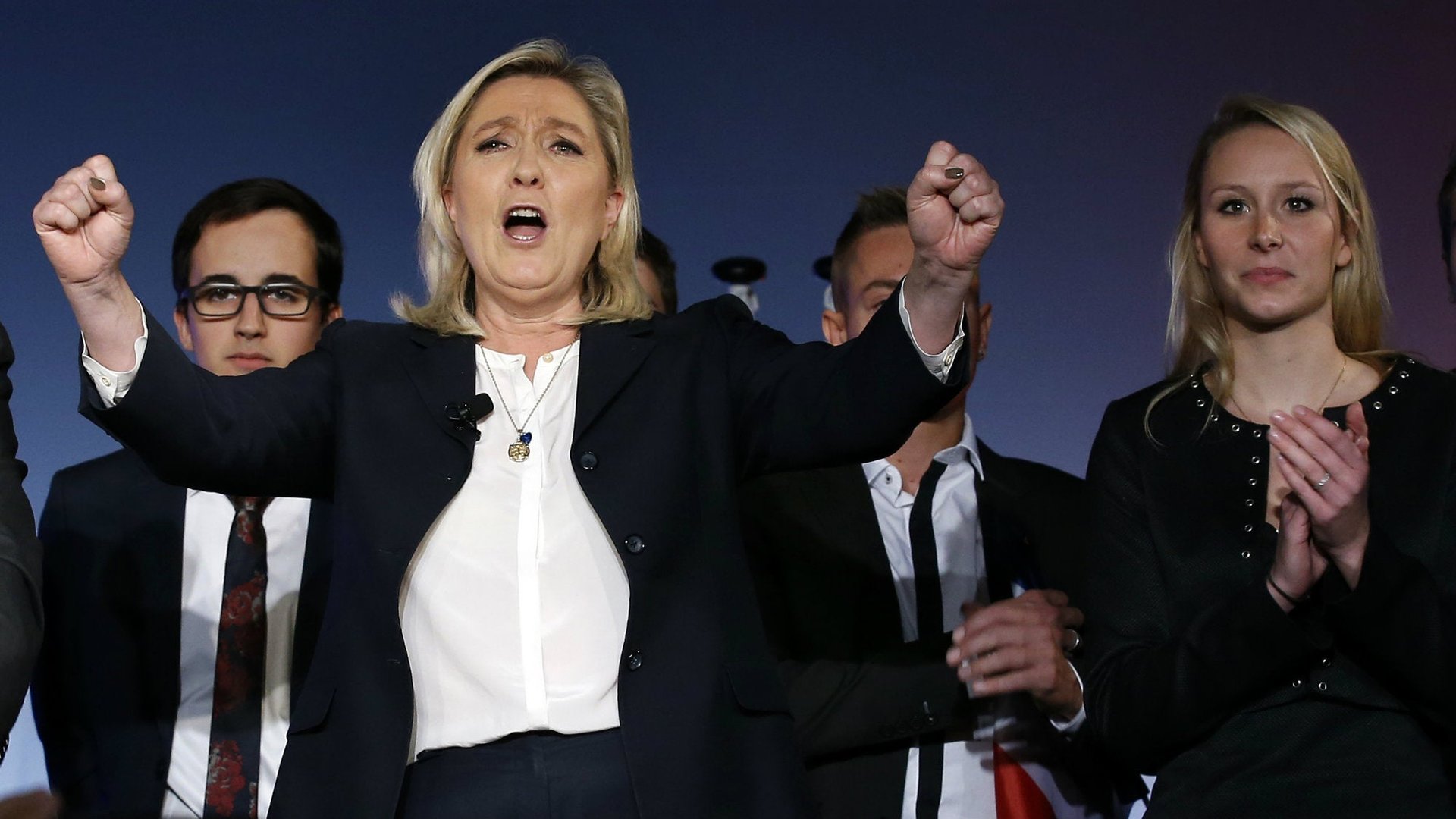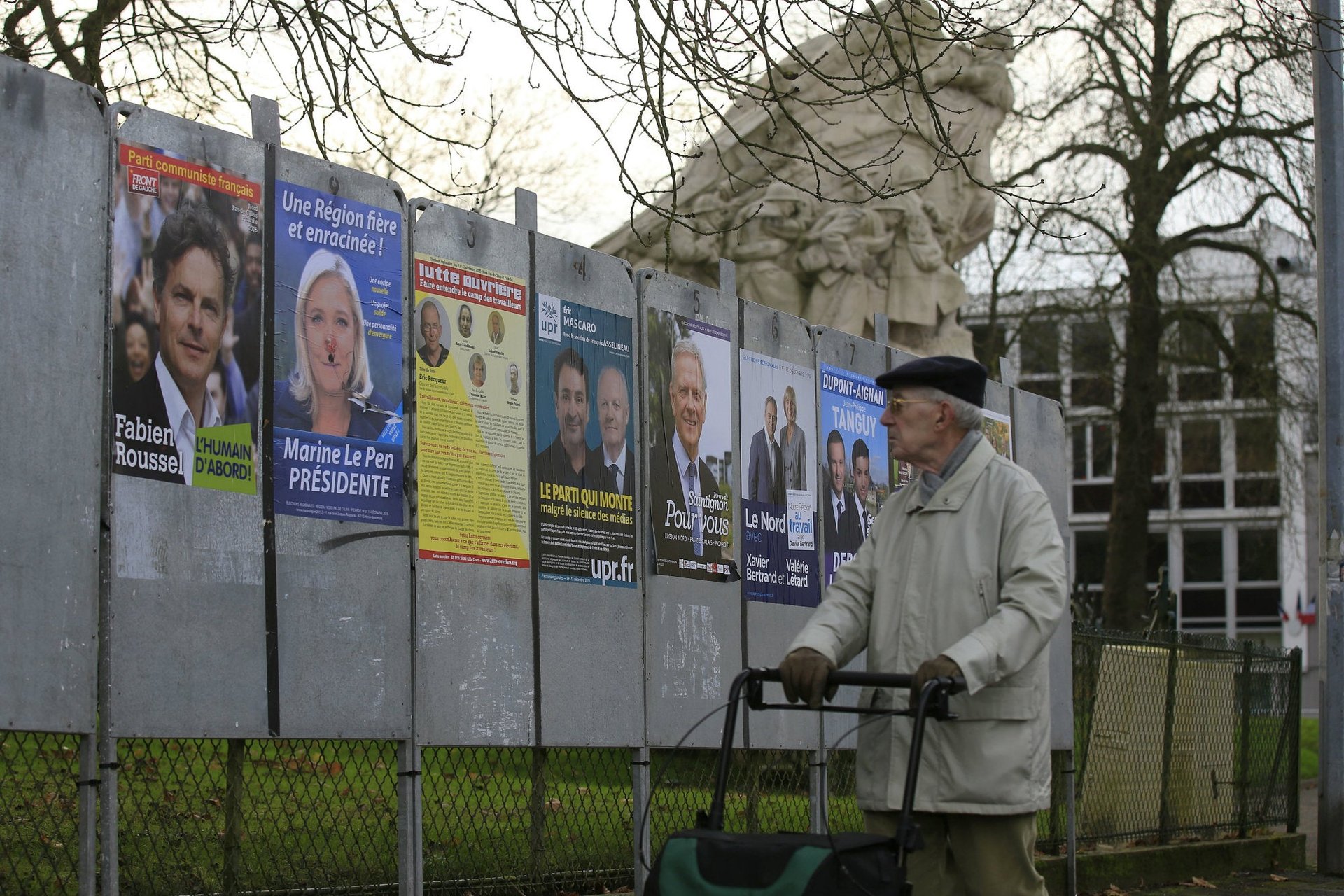With France under constant attack, the far-right looks to turn fear into power
Paris


Paris
For years, the National Front, France’s far-right party, said that security and immigration were two of the country’s biggest problems. In the aftermath of the terror attacks in Paris that killed 130 people and injured more than 300 on Nov. 13, an increasing number of voters are now turning to the party.
On Sunday (Dec. 6), the first round of elections for the country’s 13 regional councils will be a key test of whether those gains in the polls will be reflected at the ballot box.
The latest surveys show a lead for the National Front in the Nord-Pas-de-Calais-Picardie and the Provence-Alpes-Cote d’Azur regions. According to polling institute BVA, the National Front would prevail in the second round of voting on Dec. 13 (assuming that no party achieves an outright majority in the first round) with 44% and 43% of votes in the two regions, respectively.
Pascal Perrineau, a professor at Sciences Po in Paris, said the far-right’s gain in popularity could already be seen after the deadly attacks on the satirical magazine Charlie Hebdo and a kosher grocery store in January.
“The themes of security and immigration have been the National Front’s themes for 30 years,” Perrineau tells Quartz. “Now the news is putting those themes in the forefront and the National Front is benefiting. The National Front and [party leader] Marine Le Pen haven’t really been campaigning” following the attacks, he notes. “They are letting the facts speak for them.”
Jean-Marie Le Pen founded the National Front in 1972 and remained at the helm until 2011. His daughter Marine was elected as his successor. She has made efforts to soften the party’s far-right image and even ousted her father when he referred more than once to Nazi gas chambers as a mere “point of detail” in the history of World War II.

Marine Le Pen is standing for president of the Nord-Pas-de-Calais-Picardie region. And Marion Marechal-Le Pen, Marine’s 25-year-old niece and a rising star in the party, was tapped to run the National Front’s campaign in the Provence-Alpes-Cote d’Azur instead of her grandfather, the party’s founder.
Some of the party’s once radical ideas seem more mainstream now, especially when echoed by socialist president François Hollande. Days after the Nov. 13 attacks, Hollande announced to parliament that he seeks to obtain the right to strip dual-citizens born in France of their French citizenship if they are involved in terrorist acts against the country, an idea long supported by the National Front. At the moment, France may revoke citizenship only of dual-citizens who were not born in France.
Still, many voters refuse to turn to the National Front even if they are dissatisfied with the current government. Sarah Pescher, a 30-year-old Parisian, plans to place a blank bulletin in her envelope tomorrow. She works at a school near one of the sites of the Nov. 13 terror attacks.
“All of the candidates say the same thing,” she said, as she studied the campaign posters on billboards along the sidewalk. “They don’t listen enough to the people. Nothing has changed since Charlie Hebdo. It’s more like discourse to calm the people than discourse to take action. We need action and we don’t need to be calmed. It’s like they live on another planet.”
Philippe Dumont, 50, also was feeling a sense of dissatisfaction. His thoughts weren’t regarding the response to terrorism, but the handling of the country’s economy. Dumont, an entrepreneur, said that he has so little belief in the system that he stopped voting at the time of the last presidential election, in 2012.
“My wallet has been voting socialist for a while so I won’t vote socialist,” he said as he drank coffee with a friend at a neighborhood café. “There’s never been as much unemployment and as many taxes. Sure, I was pleasantly surprised by the management of the terrorism crisis. But politics is one thing and the economy is another.”
Back at Sciences Po, Perrineau doesn’t expect the National Front’s increase in popularity to transform the political landscape in France.
“The Le Pen family is known as extreme right,” Perrineau says. “The National Front scares most French, who think the party is not capable of governing. The party’s results will be a bit higher than in the past, but this election won’t result in much change.”